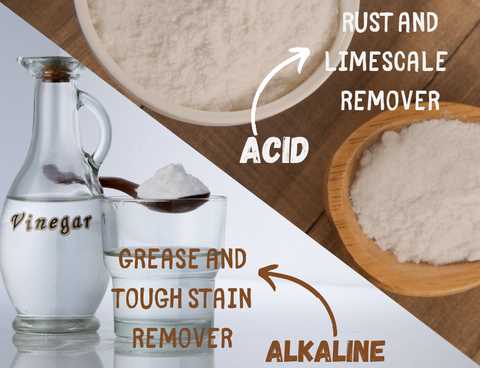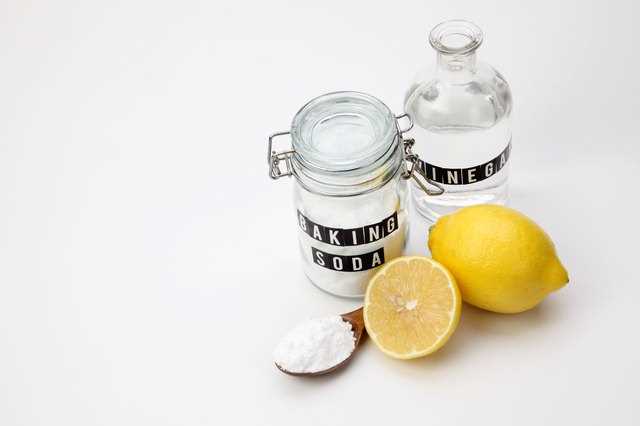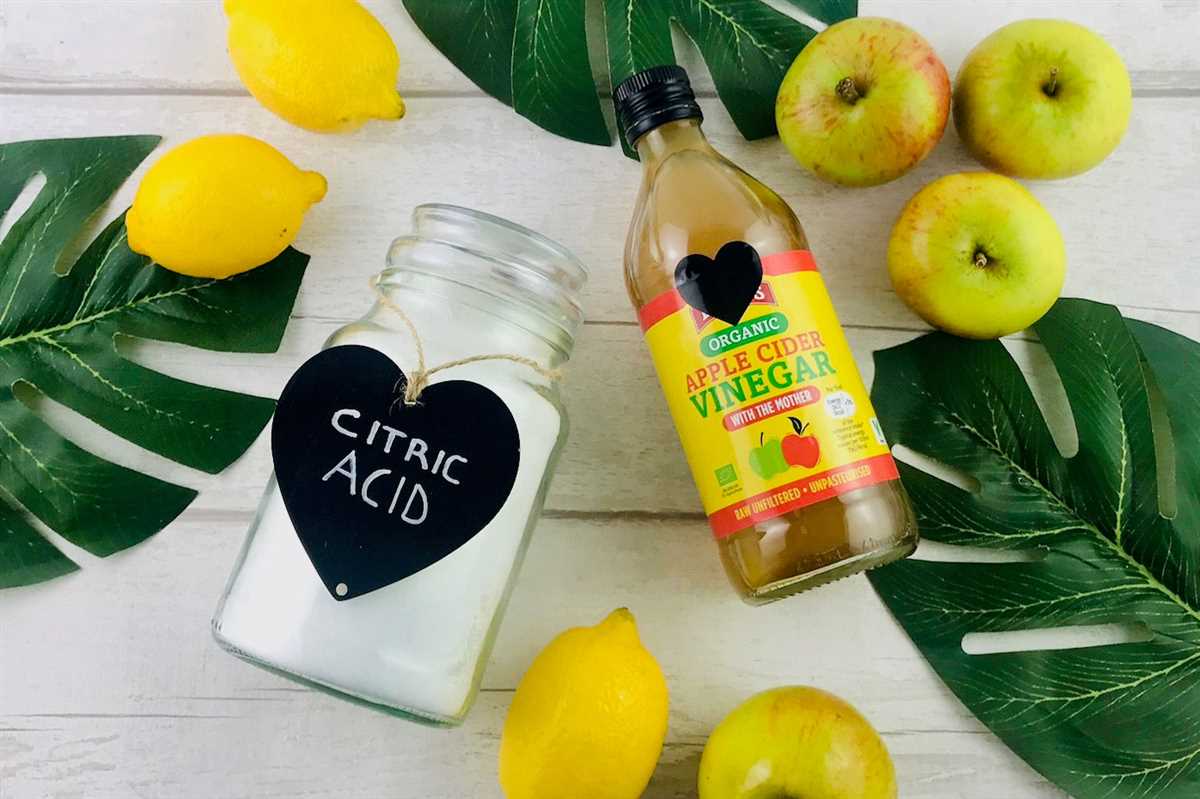




Keeping our homes clean and free of germs is a top priority for many of us. When it comes to natural cleaning agents, citric acid and vinegar are two common options that people often turn to. Both have their advantages and disadvantages, making it important to understand which one is better for cleaning.
Citric acid is a natural acid derived from citrus fruits like lemons, oranges, and grapefruits. It is a powerful cleaning agent that can be used to remove tough stains, dissolve mineral buildup, and eliminate odours. Citric acid is also known for its antibacterial properties, making it an effective choice for disinfecting surfaces.
Vinegar is another popular natural cleaning agent made from fermented ethanol. It has long been used as a household cleaner due to its ability to break down grease, kill bacteria, and remove stubborn dirt. Vinegar is also known for its versatility, as it can be used to clean a variety of surfaces, from windows and countertops to floors and appliances.
However, there are pros and cons to consider when choosing between citric acid and vinegar for cleaning. One advantage of citric acid is that it is generally considered safer to use than vinegar, as it is less acidic and therefore less likely to cause irritation. Additionally, citric acid has a pleasant citrus scent, which can leave your home smelling fresh and clean.
On the other hand, vinegar has a strong smell that may not be appealing to everyone. While some people find the scent dissipates quickly, others may prefer the more subtle fragrance of citric acid. Another drawback of vinegar is that its high acidity can damage certain surfaces over time, such as natural stone countertops or hardwood floors.
In conclusion, both citric acid and vinegar are effective natural cleaning agents with their own set of pros and cons. The choice between the two ultimately depends on personal preference, the specific cleaning task at hand, and the surfaces being cleaned. It may be worth experimenting with both to determine which one works best for you and meets your cleaning needs.
Exploring the Pros and Cons: Citric Acid vs Vinegar for Cleaning

Pros of Citric Acid for Cleaning
- Environmentally friendly: Citric acid is a natural compound derived from citrus fruits, making it a non-toxic and biodegradable cleaning agent.
- Effective against mineral deposits: Citric acid is particularly useful for removing hard water stains, limescale, and mineral deposits due to its acidic properties.
- Odor control: Citric acid has a pleasant citrus scent that can help mask unpleasant odors in the cleaning process.
- Versatile: Citric acid can be used to clean a wide range of surfaces, including countertops, sinks, toilets, and showerheads.
Cons of Citric Acid for Cleaning
- Not suitable for all surfaces: Citric acid is acidic and can potentially damage certain surfaces, such as marble and granite. It is important to test it on a small, inconspicuous area before using it on sensitive surfaces.
- Slower action: While citric acid is effective, it may require more time and scrubbing to remove stubborn stains compared to stronger household cleaners.
Pros of Vinegar for Cleaning

- Multi-purpose cleaner: Vinegar can be used for various cleaning tasks, such as removing stains, deodorizing, and disinfecting surfaces.
- Antibacterial properties: Vinegar contains acetic acid, which has antibacterial properties that can help kill certain types of bacteria.
- Non-toxic: Vinegar is a safe and natural alternative to harsh chemical cleaners, making it a suitable option for households with children and pets.
- Readily available and cost-effective: Vinegar is widely available in grocery stores and is relatively inexpensive compared to specialized cleaning products.
Cons of Vinegar for Cleaning

- Strong odor: Vinegar has a strong odor that can be overpowering, especially in enclosed spaces. The smell can linger even after the cleaning process.
- Not suitable for all surfaces: Like citric acid, vinegar can damage certain surfaces, such as marble, granite, and hardwood floors. Care should be taken to use it on compatible surfaces.
- Ineffective against certain stains: Vinegar is not always effective against tough stains like grease or oil. It may require additional cleaning methods or products for optimal results.
Conclusion
Both citric acid and vinegar offer advantages and disadvantages when it comes to cleaning. Citric acid is effective against mineral deposits but may take more time and effort to remove stubborn stains. Vinegar is a versatile cleaner with antibacterial properties but has a strong odor and may not be suitable for all surfaces. Consider the specific cleaning needs and surfaces in your home to determine which cleaning agent is best for you.
Understanding Citric Acid
Citric acid is a naturally occurring acid that is found in citrus fruits such as lemons, limes, and oranges. It is a white crystalline powder that is often used as a food additive due to its sour taste and preservative properties. However, citric acid also has many other uses, including cleaning and household applications.
What is Citric Acid Used For?
Citric acid is commonly used as an ingredient in various household cleaning products due to its ability to effectively remove deposits, stains, and dirt. It is particularly effective in removing soap scum, hard water stains, limescale, and rust. Additionally, citric acid can be used as a natural disinfectant, deodorizer, and descaler.
Here are some common household applications of citric acid:
- Cleaning kitchen appliances, such as coffee makers, kettles, and dishwashers.
- Removing mineral deposits from bathroom fixtures and tiles.
- Descaling heating elements in appliances like washing machines and boilers.
- Removing rust stains from metal surfaces.
- Eliminating odours from garbage disposals and trash cans.
Pros of Using Citric Acid for Cleaning
There are several advantages to using citric acid for cleaning:
- Natural and Environmentally Friendly: Citric acid is a natural compound that is derived from citrus fruits. It is biodegradable, non-toxic, and safer to use compared to many chemical cleaning products.
- Effective Cleaner: Citric acid has powerful cleaning properties and can effectively dissolve and remove dirt, stains, and deposits. It is particularly effective in removing limescale and soap scum.
- Versatile: Citric acid can be used for various cleaning tasks around the house, from kitchen appliances to bathroom fixtures.
- Safe for Different Surfaces: Citric acid is less likely to damage or corrode surfaces compared to vinegar or other stronger acids.
- Pleasant Smell: Citric acid has a pleasant citrus scent that can leave the cleaned surfaces smelling fresh.
Cons of Using Citric Acid for Cleaning
Despite its many advantages, there are a few drawbacks to using citric acid for cleaning:
- Less Effective on Some Stains: While citric acid is highly effective on certain types of stains, it may not be as effective on tougher stains like grease or oil.
- Requires Time: Some cleaning tasks may require longer contact time with citric acid for optimal results.
- May Discolor Some Surfaces: Citric acid can potentially discolor certain surfaces, especially if used in high concentrations. It is always recommended to test in an inconspicuous area before using it on a larger area.
Overall, citric acid is a versatile and effective natural cleaner that can be used for a variety of cleaning tasks. It is a safer and more environmentally friendly alternative to many chemical cleaning products, but it may not be suitable for all types of stains or surfaces. It is important to consider the pros and cons and test it in small areas before using it for larger cleaning projects.
Understanding Vinegar
Vinegar is a versatile and common household cleaning product. It is a type of liquid made from the fermentation of ethanol by acetic acid bacteria. The acetic acid content in vinegar is what gives it its distinct sour taste and strong odor.
There are different types of vinegar available, with the most common being white vinegar and apple cider vinegar. White vinegar is made from distilled alcohol and has a higher acetic acid content, while apple cider vinegar is made from fermented apple juice and has a slightly lower acetic acid content.
One of the main advantages of vinegar as a cleaning agent is its natural and non-toxic properties. It is an environmentally friendly alternative to harsh chemicals and can be used in various cleaning tasks around the house.
Pros of using vinegar for cleaning:
- Natural and non-toxic: Vinegar is a safe and non-toxic cleaning agent that does not pose any health risks when used properly.
- Multi-purpose: Vinegar can be used for a wide range of cleaning tasks, including removing stains, deodorizing, disinfecting, and descaling.
- Effective against certain types of dirt and grime: Vinegar is particularly effective at removing mineral deposits, soap scum, and rust stains.
- Cost-effective: Vinegar is an affordable cleaning option compared to commercial cleaning products.
Cons of using vinegar for cleaning:
- Not suitable for all surfaces: Vinegar is acidic and may damage certain surfaces such as marble, granite, or stone. It is important to test vinegar on a small inconspicuous area before using it on sensitive surfaces.
- Pungent smell: Vinegar has a strong, distinctive odor that some people find unpleasant. However, the smell dissipates quickly once the vinegar dries.
- Less effective against grease and oil: While vinegar can be effective for general cleaning, it may not be as effective at cutting through heavy grease or oil buildup.
In conclusion, vinegar is a versatile and natural cleaning agent that can be an effective option for various cleaning tasks. However, it is important to consider its limitations and suitability for different surfaces before using it as a cleaning solution.
Comparing the Pros and Cons
Pros of Citric Acid for Cleaning:
- Natural and Safe: Citric acid is a natural compound found in fruits, making it a safer option compared to harsh chemical cleaners. It is non-toxic and biodegradable.
- Effective against Hard Water Stains: Citric acid has the ability to dissolve and remove hard water stains, calcium deposits, and other mineral build-up effectively.
- Mild Odor: Unlike vinegar, citric acid has a milder odor that many people find more pleasant.
- Versatile: Citric acid can be used for various cleaning tasks, including descaling coffee makers, removing soap scum, and cleaning kitchen appliances.
Cons of Citric Acid for Cleaning:
- Not as Strong as Vinegar: Citric acid may not be as powerful as vinegar when it comes to tackling tough stains or grease.
- May Discolor Some Surfaces: Citric acid can potentially leave mild discoloration on certain surfaces, especially if not properly diluted.
- More Expensive: Compared to vinegar, citric acid is generally more expensive to purchase, especially in larger quantities.
Pros of Vinegar for Cleaning:
- Powerful Disinfectant: Vinegar has antimicrobial properties that make it an effective disinfectant for various surfaces.
- Effective against Mold and Mildew: Vinegar’s acidity helps in killing mold and mildew, making it a popular choice for bathroom cleaning.
- Cost-effective: Vinegar is easily accessible and affordable, making it a budget-friendly cleaning option.
- Versatile: Vinegar can be used for various cleaning tasks, including removing stains, eliminating odors, and cleaning windows.
Cons of Vinegar for Cleaning:
- Strong Odor: Vinegar has a pungent odor that lingers, which some people may find unpleasant.
- Can Damage Some Surfaces: The acidity of vinegar can damage certain surfaces, including natural stone, marble, and hardwood floors.
- Not as Effective against Hard Water Stains: While vinegar can remove some hard water stains, it may not be as effective as citric acid in dealing with severe build-up.
In conclusion, both citric acid and vinegar have their own pros and cons when it comes to cleaning. It ultimately depends on personal preferences, the type of surface or stain being cleaned, and the specific cleaning task at hand. Citric acid is a natural and safe option, effective against hard water stains, but it may not be as strong or versatile as vinegar. Vinegar, on the other hand, is a powerful disinfectant, effective against mold and mildew, and more budget-friendly, but it has a strong odor and can damage certain surfaces. Consider the factors mentioned and choose the option that best suits your needs and preferences.
FAQ
What is the difference between citric acid and vinegar for cleaning?
Citric acid and vinegar are both natural cleaning agents, but they have different properties. Citric acid is a weak acid derived from citrus fruits, while vinegar is a liquid made from fermented ethanol. Citric acid is more effective at removing hard water stains and mineral deposits, while vinegar is better at cutting through grease and disinfecting surfaces.
Which is better for cleaning, citric acid or vinegar?
The choice between citric acid and vinegar for cleaning depends on the specific task at hand. If you’re trying to remove hard water stains or mineral deposits, citric acid is more effective. However, if you’re dealing with grease or want to disinfect a surface, vinegar is the better option. It ultimately comes down to personal preference and the specific cleaning needs.
Can I use citric acid or vinegar for cleaning my kitchen appliances?
Yes, both citric acid and vinegar can be used for cleaning kitchen appliances. Citric acid can effectively remove hard water stains from coffee makers, kettles, and dishwashers. Vinegar, on the other hand, is great for descaling and disinfecting appliances like microwaves and refrigerators. It’s always important to follow the manufacturer’s instructions and dilute the cleaning solution properly.
Is citric acid or vinegar better for cleaning windows?
Both citric acid and vinegar can be used for cleaning windows. However, vinegar is more commonly used for this purpose due to its ability to cut through grease and grime. To clean windows with vinegar, simply dilute it with water in a spray bottle, spray it onto the glass, and wipe it clean with a microfiber cloth or newspaper. Citric acid can also be used in a similar way, but vinegar is generally more effective.
What are the disadvantages of using citric acid for cleaning?
While citric acid is generally safe and effective for cleaning, it does have some disadvantages. One of the main drawbacks is that it may leave a sticky residue if not properly rinsed off. Additionally, citric acid may not be as effective at cutting through grease compared to vinegar. It’s also important to note that citric acid should not be used on marble or other natural stones, as it can etch and damage the surface.
Are there any cons to using vinegar for cleaning?
While vinegar is a versatile and effective cleaning agent, it does have a few cons. The strong smell of vinegar can be off-putting for some people, although it dissipates quickly. Vinegar should also not be used on certain surfaces like granite or marble, as it can cause damage. Additionally, vinegar may not be as effective at removing stubborn stains compared to other cleaning products. Overall, vinegar is a great natural cleaner, but it may not be suitable for every cleaning task.











